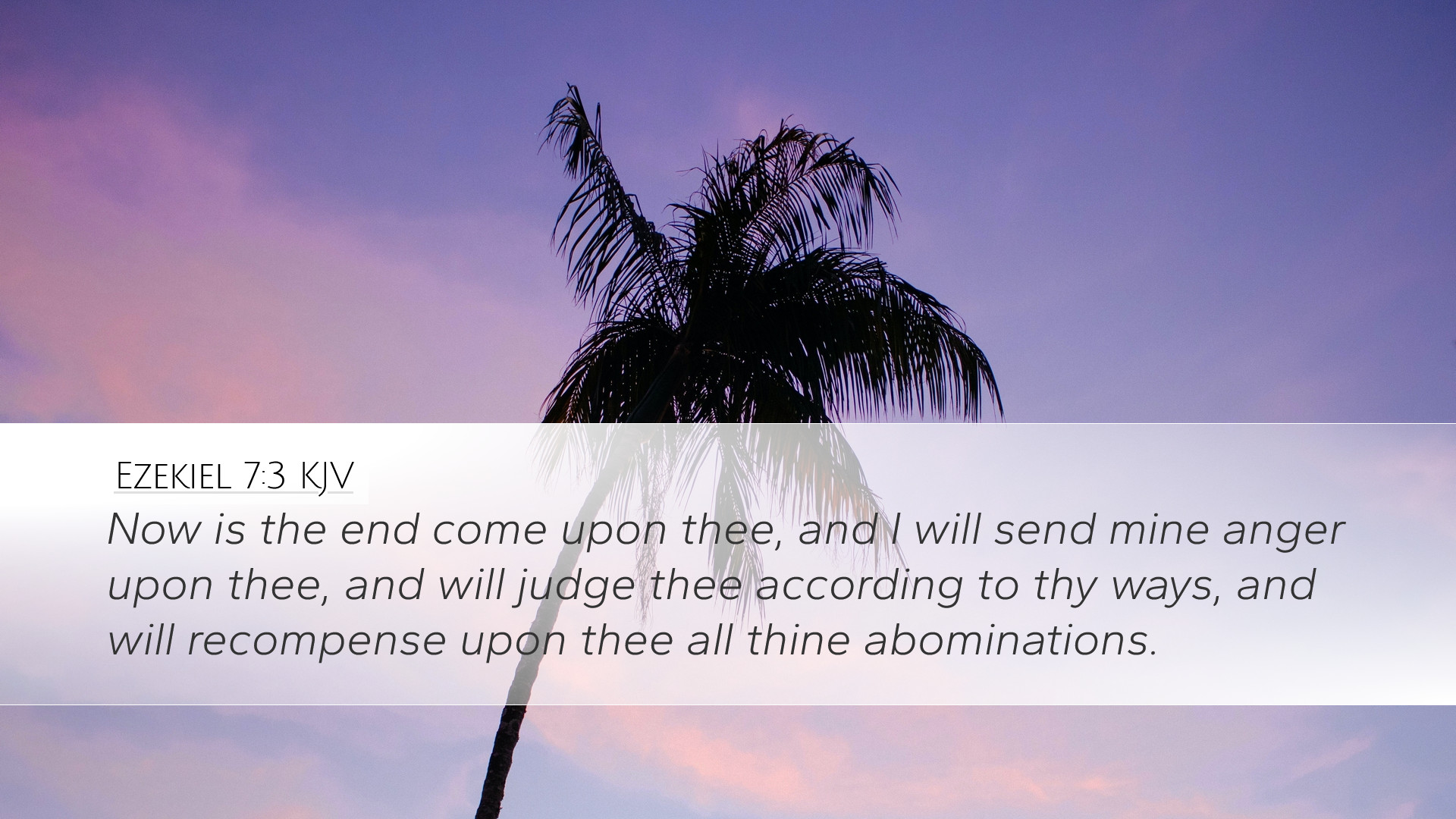Commentary on Ezekiel 7:3
Ezekiel 7:3 states: "Now is the end come upon thee, and I will send mine anger upon thee, and will judge thee according to thy ways, and will recompense upon thee all thine abominations."
Contextual Background
The Book of Ezekiel is a prophetic text that reflects the tumultuous period of the Babylonian exile. Ezekiel, called as a prophet while in exile, addresses the people of Israel, emphasizing God's judgment and the impending destruction of Jerusalem. This particular verse, Ezekiel 7:3, serves as a pivotal declaration regarding the fate of Israel due to their persistent disobedience and idolatry.
Analysis of Ezekiel 7:3
Divine Judgment
Ezekiel 7:3 emphasizes the certainty and immediacy of God's judgment: "Now is the end come upon thee." This statement marks a significant turning point, indicating that the time for repentance has passed and judgment is about to be executed. Both Matthew Henry and Albert Barnes highlight that this judgment is a consequence of Israel’s continual rebellion against God’s commands.
God’s Anger
The phrase "I will send mine anger upon thee" reflects the intense emotion of God toward sin. Adam Clarke suggests that God’s anger is not arbitrary but is a righteous response to Israel's actions. God's wrath is just, as it is directed towards the abominations that the people had committed, violating the covenant established with them.
Judgment According to Their Ways
The statement "and will judge thee according to thy ways" introduces the principle of divine justice. Albert Barnes notes that God's judgment is always based on human actions, aligning with the broader biblical theme that individuals bear responsibility for their choices. The righteous character of God ensures that His judgment is fair, serving as a reminder to all that actions have consequences.
Recompense for Abominations
Continuing with the phrase "and will recompense upon thee all thine abominations", this section denotes the cumulative effect of Israel's sins, often described as idolatry and injustice. Matthew Henry expounds on this by stating that the “abominations” refer to not just personal sins but the systemic failures within Israel that led them away from God. The recompense serves both as punishment and a means of purification, necessary for restoring the covenant relationship between God and His people.
Theological Insights
This verse invites reflection on several theological themes:
- The Sovereignty of God: God's control over history and nations is paramount. The events that lead to the destruction of Jerusalem underscore the unfolding of God's sovereign plan.
- The Holiness of God: God's character cannot overlook sin. His holiness demands righteousness, which Israel has abandoned.
- The Nature of Repentance: This summons for judgment challenges readers to consider their state before God, emphasizing the need for genuine repentance and a return to righteousness.
- Hope Amid Judgment: While this passage speaks of impending doom, the context of the entire book of Ezekiel reveals a promise of restoration, indicating God's enduring mercy even in judgment.
Application for Today
For pastors, students, and scholars, Ezekiel 7:3 serves as a sobering reminder of the consequences of unrepentant sin. The following applications can be drawn from this text:
- Encouragement to Seek Holiness: Believers are called to examine their lives, urging a proactive approach to sin and disobedience.
- The Role of the Church: The church has a responsibility to address sin within its community, mirroring God's righteous judgment with loving exhortation and guidance toward repentance.
- Hope in Judgement: While God's judgment is serious, the promise of restoration should encourage faith and provide hope that repentance can lead to reconciliation with God.
- Study of God’s Character: Pastors and scholars should deeply engage with the attributes of God as revealed in scripture to understand the gravity of His judgment and the depth of His mercy.
Conclusion
Ezekiel 7:3 stands as a powerful witness to God’s justice in a world often fraught with injustice. This commentary synthesizes insights while inviting a deeper understanding of God's nature regarding judgment and mercy. As we reflect on this verse, may it inspire all who read it to pursue a life aligned with God’s will, fostering a relationship characterized by reverence, justice, and repentance.


